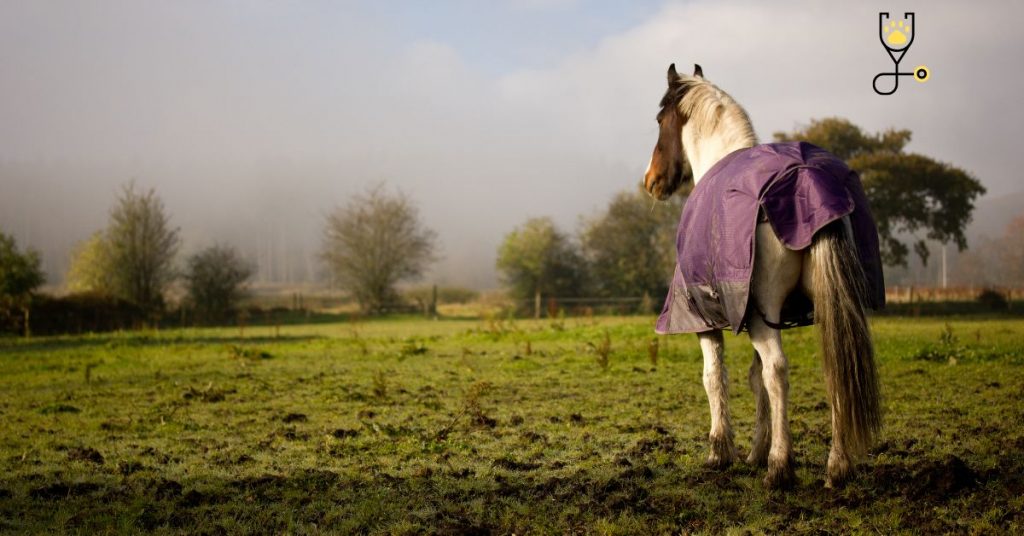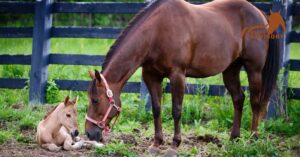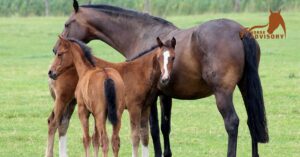Introduction
As the days get shorter and the temperatures start to drop, horse owners need to take precautions to keep their horses healthy. One of the biggest challenges in winter is keeping horses from getting too hot or too cold. In this blog post, we’ll discuss how to cool out a horse in the cold weather-including ways to dry out a sweating horse and prevent chills. Stay warm and safe this winter!
Why Cool Out a Horse?
When it’s cold outside, horses need extra insulation to keep them warm. However, if they overheat (due to exercise or wearing too much clothing/blankets) they could develop dangerous chills. It’s important to cool out your horse after exertion or when the weather is especially cold-but you must do it safely.
Cooling Out a Horse in winter
- Cooling Out a Horse in winter is important to keep your horse healthy and happy. Firstly, ensure your rug your horse properly for the conditions and temperature – providing adequate protection from wind and rain. Avoid over-rugging, as this will cause the coat to sweat resulting in a chill once it cools back down again. If necessary, provide shelter or access to a shelter so that your horse can take refuge if required.
- Secondly, make sure that if they are stabled they are well bedded down with plenty of straw or shavings in order to keep them warm and comfortable during the nighttime hours. Clean out any wet bedding regularly and add more when needed.
- Thirdly, increase their hay intake slightly as extra calories help the body stay warm throughout the cold winter months. Be sure to monitor the condition of your horse and adjust the hay intake if necessary. Also make sure that you provide an ample supply of fresh, clean drinking water as dehydration can lead to a decrease in bodily temperature. Lastly, keep up with regular grooming and make sure to use warm water when washing horses during winter. This will help remove any dirt or mud that has accumulated on their coat and maintain healthy skin. While these simple steps may seem small they are important for keeping your horse happy and healthy throughout the winter season.

Drying Out a Sweating Horse in winter
1. Watering down: After exercising your horse, hose him down with lukewarm water to cool him off quickly. This will help remove any sweat and prevent the horse from getting chilled after exercise.
2. Toweling: After hosing down, dry your horse with a towel to absorb as much moisture as possible. Be sure to start at the top of the neck and work your way down toward the legs while gently rubbing in order to increase circulation and warmth.
3. Blanketing: Once mostly dry, put on a lightweight stable blanket or cooler on your horse to maintain their body temperature and help keep them warm during the colder months.
4. Blanket changes: Make sure to check your horse’s blanket regularly and change it as needed. A wet or dirty blanket can cause chills, so be sure to remove any wet blankets and replace them with a dry ones.
5. Exercise: Make sure to provide your horse with regular exercise in order to maintain their body temperature and keep them warm.
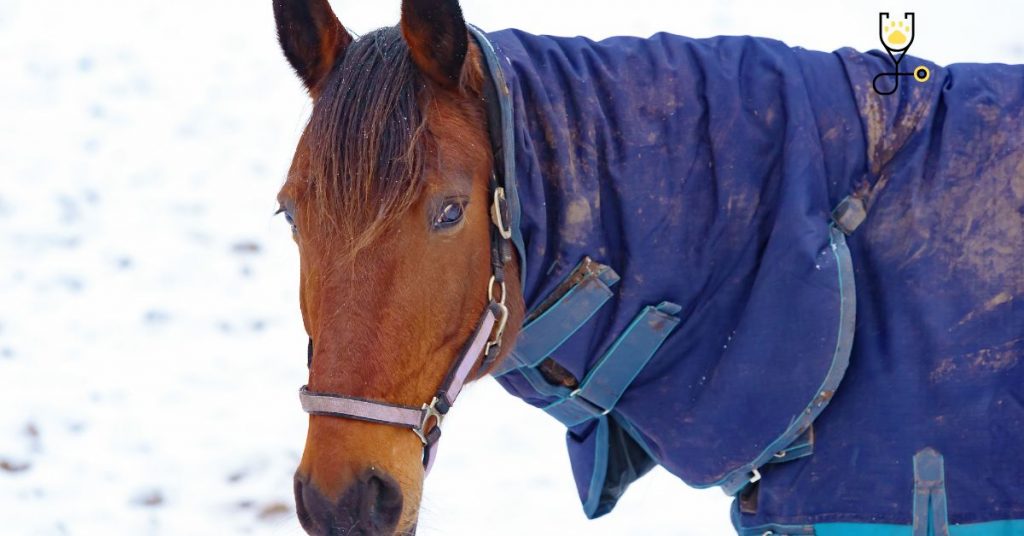
Preventing Chills in winter
1. Exercise: Exercise is important for keeping your horse healthy and its muscles warm during the colder months. Try to keep up with regular exercise, even if it’s just walking around the paddock or arena.
2. Grooming: Regular grooming helps maintain your horse’s coat, keeps it free of mud and dirt, and increases circulation. This will help keep them from getting too cold in the wintertime.
3. Hydration: Make sure to provide plenty of fresh, clean water for your horse year-round. Dehydration decreases the body temperature, so it’s important to make sure that they are drinking regularly in order to stay warm and healthy.
4. Stable temperature: Ensure that the stable environment is kept above freezing point in order to prevent chills. This can be done by adding extra bedding, heating the barn, and providing adequate ventilation.
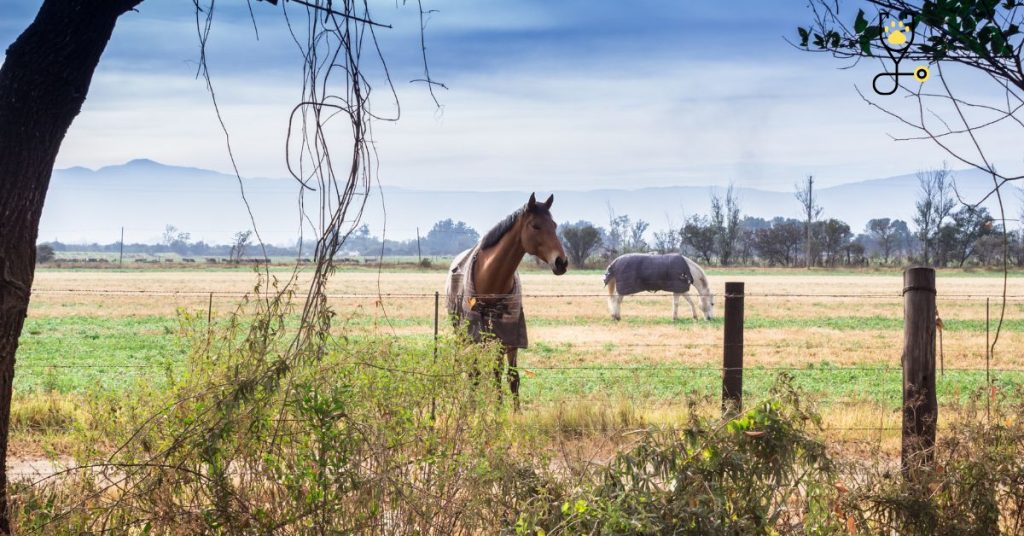
By following these simple tips you can ensure that your horse is happy and healthy during the winter months. With a bit of extra care and attention, you can help keep your horse safe, comfortable, and warm this winter season!
Conclusion
Taking the extra steps to care for your horse during cold weather will help keep them safe, comfortable, and healthy all winter long. Making sure they are adequately sheltered, well bedded down, fed plenty of hay, groomed regularly with warm water, exercised as needed, and kept hydrated will help them stay warm and prevent chills. With the right precautions and care, you can ensure that your horse will be happy and healthy throughout the winter season.
This is why it’s important to always practice proper equine care in order to keep your horse safe and healthy all year round! Being prepared for any weather conditions will help make sure your horse stays as comfortable as possible during the cold winter months. With a few extra steps of care, you can help protect your beloved equine friend this winter season!
Frequently Aske Questions
Q: What is the best way to keep my horse warm in winter?
A: You can help your horse stay warm and healthy during cold weather by providing adequate shelter, bedding down with plenty of hay, grooming them regularly with warm water, exercising as needed, keeping them hydrated, and ensuring that their stable temperature stays above freezing point. By taking these extra steps, you can ensure that your horse stays safe and comfortable during the winter months.
Q: Can cold weather affect my horse’s health?
A: Yes, cold weather can have an effect on your horse’s health if they are not properly taken care of. Horses are prone to chills during colder months, so it is important to make sure they are sheltered, bedded down with plenty of hay, groomed regularly with warm water, exercised as needed, and kept hydrated in order to prevent chills. By making sure your horse is properly taken care of during cold weather you can help ensure their health and safety.
Q: How do I know if my horse is getting too cold?
A: If your horse is shivering, has a dry and brittle coat, or is lethargic, then they may be too cold. Additionally, if your horse’s body temperature drops below 98 degrees Fahrenheit then this is also an indication that they are too cold. If you notice any of these signs, make sure to take the necessary steps to help keep them warm and comfortable. By monitoring their behavior during colder months you can help ensure their health and safety.
Q: What should I do if my horse gets too cold?
A: If your horse is too cold, make sure to take the necessary steps to help keep them warm and comfortable. This could include providing adequate shelter, bedding them down with plenty of hay, grooming them regularly with warm water, exercising as needed, and keeping them hydrated. Additionally, you can add extra bedding or heating to the barn in order to maintain a stable temperature above freezing point. By taking these extra steps, you can help ensure that your horse stays safe and comfortable during the winter months.
Q: What types of food are best for my horse in winter?
A: Hay is the primary type of food that should be fed to horses during the winter months. This can include hay cubes, alfalfa hay, or grass hay depending on your horse’s individual needs. Additionally, you can also supplement their diet with grain mixes and other high-quality foods as needed. Providing your horse with plenty of hay during cold weather will help meet its nutrition requirements while also keeping them warm and comfortable.
Hope this helps, and have a great winter season with your horse! 🙂 Happy riding!

